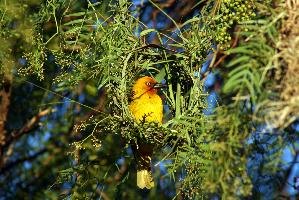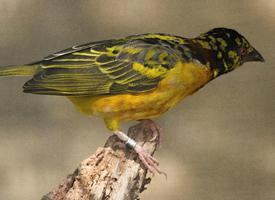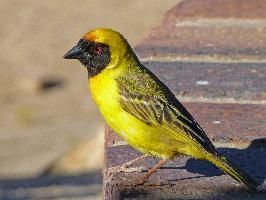
Greutăți și măsuri
| Lungime | 17 cm |
|---|
Descrierea animalului
The Southern Red Bishop (Euplectes orix), a small yet strikingly vibrant bird, is a species that captivates birdwatchers and nature enthusiasts alike. Belonging to the family Ploceidae, which is known for its weaver birds, this species exhibits a remarkable sexual dimorphism that makes it particularly interesting during the breeding season.Typically, the Southern Red Bishop can be found in sub-Saharan Africa, where it thrives in wetlands, grasslands, and areas close to water bodies. It is a bird that adapts well to agricultural lands and even urban areas, provided there are suitable habitats for nesting and feeding.
One of the most distinctive features of the Southern Red Bishop is the male's breeding plumage. During the breeding season, which varies depending on the region but generally occurs during the rainy season, the male transforms from a relatively inconspicuous bird into a vibrant spectacle. Its feathers become a fiery red and orange with a stark black bordering, making it one of the most visually striking birds in its habitat. This dramatic change is aimed at attracting females and is accompanied by elaborate display behaviors, including aerial displays, singing from prominent perches, and the construction of multiple intricate nests to entice potential mates.
In contrast, the female Southern Red Bishop and the males outside the breeding season have a more subdued appearance. They are mainly brown and heavily streaked with a lighter underbelly, blending more easily into their surroundings. This camouflage helps protect them from predators.
The diet of the Southern Red Bishop primarily consists of seeds and grains, though it also includes insects, particularly during the breeding season, to meet the higher energy demands. Their feeding behavior can sometimes bring them into conflict with farmers, as they can feed on cereal crops, but they also play a role in controlling insect pests.
Breeding is a central aspect of the Southern Red Bishop's life cycle. Males are polygynous, often mating with multiple females who then take on the responsibility of incubating the eggs and raising the young. The nests are woven with remarkable skill from grasses and other plant materials, usually suspended over water from reeds or low bushes. This placement helps protect the eggs and chicks from a range of predators.
Conservation-wise, the Southern Red Bishop is currently listed as Least Concern by the International Union for Conservation of Nature (IUCN), thanks to its wide distribution and large population. However, like many species, it faces threats from habitat destruction and changes in land use.
In summary, the Southern Red Bishop is a fascinating bird that adds a splash of color and drama to its environment. Its remarkable breeding plumage, complex mating rituals, and skilled nest-building make it a species of interest not only to ornithologists but to anyone with an appreciation for the natural world's beauty and complexity.
Animale similare
Fotografii noi cu animale
Top 10 animale
- Diana monkey (Cercopithecus diana)
- Dolphin gull (Leucophaeus scoresbii)
- Galápagos tortoise (Geochelone nigra complex)
- Moustached guenon (Cercopithecus cephus)
- Japanese spider crab (Macrocheira kaempferi)
- Colossal squid (Mesonychoteuthis hamiltoni)
- Fox tapeworm (Echinococcus multilocularis)
- Stone loach (Barbatula barbatula)
- Japanese macaque (Macaca fuscata)
- Barbary macaque (Macaca sylvanus)

